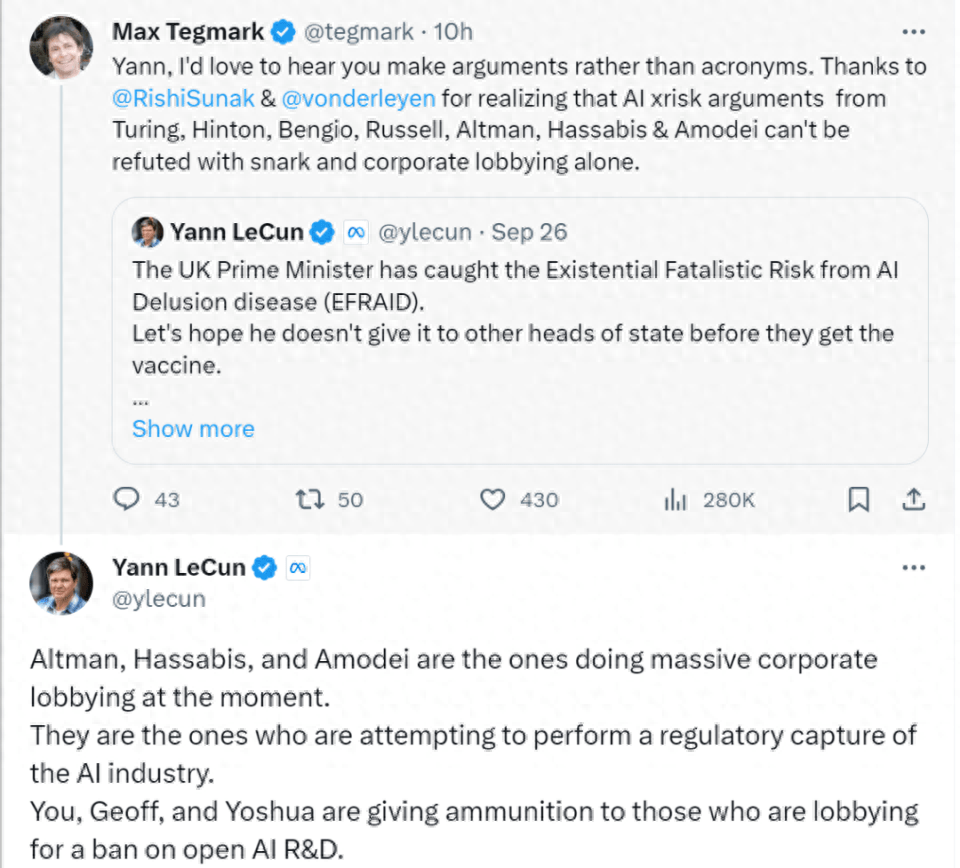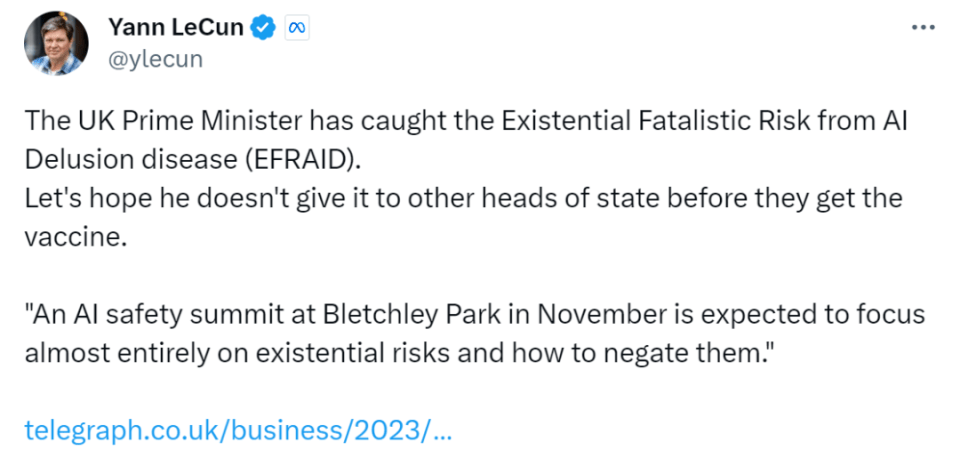 Technology peripherals
Technology peripherals
 AI
AI
 Turing Award winners are arguing, LeCun: Bengio, Hinton and other AI extinction theories are ridiculous
Turing Award winners are arguing, LeCun: Bengio, Hinton and other AI extinction theories are ridiculous
Turing Award winners are arguing, LeCun: Bengio, Hinton and other AI extinction theories are ridiculous
The rewritten content is as follows: Machine Heart Report
Editor: Chen Ping, Da Pan Chicken
LeCun said that the vast majority of academic colleagues are very supportive of open AI research and development, but there are still opponents.
Regarding the issue of artificial intelligence risks, experts from all parties have different opinions. Someone initiated a joint letter calling on the artificial intelligence laboratory to immediately stop research. Important figures in deep learning, Geoffrey Hinton and Yoshua Bengio, all support this view
Just in recent days, Bengio, Hinton and others issued a joint letter "Managing Artificial Intelligence Risks in an Era of Rapid Development", calling on researchers to take emergency governance measures and incorporate safety and ethical practices before developing AI systems. Focus, calling on governments to take action to manage the risks brought by AI.
The rewritten content is: Some urgent governance measures are mentioned in the article, such as involving national institutions to prevent people from abusing artificial intelligence. To regulate effectively, governments need a comprehensive understanding of AI developments. Regulators should take a series of measures, such as model registration, effectively protecting the rights and interests of whistleblowers, and monitoring model development and supercomputer use. Regulators will also need to evaluate advanced AI systems before deployment to understand their potentially dangerous capabilities
Not only that, but going back a little further, in May this year, the Center for the Security of Artificial Intelligence, a US non-profit organization, issued a statement warning that artificial intelligence should be regarded as having the same risk of annihilating humanity as epidemics, supporting the statement The same people include Hinton, Bengio and others.
In May of this year, Hinton also resigned from his job at Google in order to speak freely about the risks posed by artificial intelligence. In an interview with the New York Times, he said: "Most people think this (the harm of AI) is still far away. I used to think it was still far away, maybe 30 to 50 years or more. But obviously, I I don’t think so now."
For Hinton and others, managing the risks posed by artificial intelligence is an urgent task
Despite this, Euan Lecon, as one of the three giants of deep learning, has a very optimistic attitude towards the development of artificial intelligence. He is basically opposed to signing a joint letter on the risks of artificial intelligence, believing that the development of artificial intelligence does not constitute a threat to humanity
Just now, in a communication with X users, LeCun gave answers to some questions from netizens about AI risks.

This netizen asked LeCun for his opinion on the article "'This is his climate change': The experts helping Rishi Sunak seal his legacy". The article believes that the statement jointly issued by Hinton, Bengio and others has changed people's views on artificial intelligence. Shift from viewing AI as a supportive tool to viewing it as a potential threat. The article goes on to say that in recent months, British observers have discovered that more and more people are worried that artificial intelligence will cause the end of the world. In March this year, the British government published a white paper promising not to stifle artificial intelligence innovation. But just two months later, the UK began discussing setting limits on artificial intelligence and urged the United States to join its plan for global artificial intelligence rules

Please rewrite the content into Chinese, the original sentence does not need to appear
The content that needs to be rewritten is: https://www.telegraph.co.uk/business/2023/09/23/artificial-intelligence-safety-summit-sunak-ai-experts/
LeCun’s reaction to the article was that he didn’t want Britain’s concerns about the fatalistic risks of AI to spread to other countries.

After that, there is the communication between LeCun and X users that we mentioned earlier. The following are all LeCun’s answers:
"Altman, Hassabis, and Amodei are engaged in massive corporate lobbying. They are trying to regulate the AI industry. And you, Geoff, and Yoshua are providing ammunition to those lobbying to ban open AI research.
If your campaign is successful, it will inevitably lead to what we believe will be a catastrophic outcome: a handful of companies will control artificial intelligence
The vast majority of academic colleagues are very supportive of open AI research and development. Few people believe the doomsday scenarios you preach. You, Yoshua, Geoff and Stuart are the only exceptions.
Like many people, I am a big supporter of open AI platforms because I believe in a combination of forces: people’s creativity, democracy, market forces, and product regulations. I also know that it is possible to produce AI systems that are safe and under our control. I have made specific suggestions for this. This will all lead to people doing the right thing.
AI does not arise out of thin air. It is a natural phenomenon that we cannot control, but this is not the case. Its progress is driven by everyone we know. We and they both have the power to create “the right thing.” Calling for regulation of R&D implicitly assumes that these people and the organizations they work for are incompetent, reckless, self-destructive, or evil. but it is not the truth
I have presented many arguments to prove that the doomsday scenario you fear is absurd. I won't go into details here. But the main point is that if powerful AI systems are driven by goals, including guardrails, then they will be safe and controllable because they set those guardrails and goals. (Current autoregressive language models are not goal-driven, so we should not infer from the weaknesses of autoregressive language models)
On the subject of open source, your activities will have the exact opposite effect of what you are pursuing. In the future, artificial intelligence systems will become a treasure trove of human knowledge and culture. What we need is an open source and free platform so that everyone can contribute to it. Only open platforms can reflect all human knowledge and culture, which requires that contributions to these platforms be crowdsourced, similar to Wikipedia. If the platform is not open, this will not work
If open source AI platforms are regulated, another situation will inevitably occur, that is, a few companies will control the AI platform and thus control people's entire digital dependence. What does this mean for democracy? What does this mean for cultural diversity? This is what keeps me up at night. 』
Under LeCun’s long tweet, many people also “supported” his views.
Irina Rish, a professor in the Department of Computer Science and Operations Research at the University of Montreal, is a core member of the Mila-Quebec AI Institute. She believes that researchers who support open source AI should no longer remain silent, but should play a leading role in the development of emerging AI

e/acc founder Beff Jezos also said in the comment area that such comments are important and what people need.

Netizens said that initially, discussing security issues can enrich everyone’s imagination about future technology, but sensational science fiction novels should not lead to the emergence of monopoly policies.
Podcast host Lex Fridman has more to look forward to from this debate.

Discussions about AI risks will also affect the future development of AI. When an idea steals the spotlight, people follow it blindly. Only when the two parties can continue to conduct rational discussions can the "true face" of AI be truly seen.
The above is the detailed content of Turing Award winners are arguing, LeCun: Bengio, Hinton and other AI extinction theories are ridiculous. For more information, please follow other related articles on the PHP Chinese website!

Hot AI Tools

Undresser.AI Undress
AI-powered app for creating realistic nude photos

AI Clothes Remover
Online AI tool for removing clothes from photos.

Undress AI Tool
Undress images for free

Clothoff.io
AI clothes remover

AI Hentai Generator
Generate AI Hentai for free.

Hot Article

Hot Tools

Notepad++7.3.1
Easy-to-use and free code editor

SublimeText3 Chinese version
Chinese version, very easy to use

Zend Studio 13.0.1
Powerful PHP integrated development environment

Dreamweaver CS6
Visual web development tools

SublimeText3 Mac version
God-level code editing software (SublimeText3)

Hot Topics
 What is Model Context Protocol (MCP)?
Mar 03, 2025 pm 07:09 PM
What is Model Context Protocol (MCP)?
Mar 03, 2025 pm 07:09 PM
The Model Context Protocol (MCP): A Universal Connector for AI and Data We're all familiar with AI's role in daily coding. Replit, GitHub Copilot, Black Box AI, and Cursor IDE are just a few examples of how AI streamlines our workflows. But imagine
 Building a Local Vision Agent using OmniParser V2 and OmniTool
Mar 03, 2025 pm 07:08 PM
Building a Local Vision Agent using OmniParser V2 and OmniTool
Mar 03, 2025 pm 07:08 PM
Microsoft's OmniParser V2 and OmniTool: Revolutionizing GUI Automation with AI Imagine AI that not only understands but also interacts with your Windows 11 interface like a seasoned professional. Microsoft's OmniParser V2 and OmniTool make this a re
 I Tried Vibe Coding with Cursor AI and It's Amazing!
Mar 20, 2025 pm 03:34 PM
I Tried Vibe Coding with Cursor AI and It's Amazing!
Mar 20, 2025 pm 03:34 PM
Vibe coding is reshaping the world of software development by letting us create applications using natural language instead of endless lines of code. Inspired by visionaries like Andrej Karpathy, this innovative approach lets dev
 Replit Agent: A Guide With Practical Examples
Mar 04, 2025 am 10:52 AM
Replit Agent: A Guide With Practical Examples
Mar 04, 2025 am 10:52 AM
Revolutionizing App Development: A Deep Dive into Replit Agent Tired of wrestling with complex development environments and obscure configuration files? Replit Agent aims to simplify the process of transforming ideas into functional apps. This AI-p
 Runway Act-One Guide: I Filmed Myself to Test It
Mar 03, 2025 am 09:42 AM
Runway Act-One Guide: I Filmed Myself to Test It
Mar 03, 2025 am 09:42 AM
This blog post shares my experience testing Runway ML's new Act-One animation tool, covering both its web interface and Python API. While promising, my results were less impressive than expected. Want to explore Generative AI? Learn to use LLMs in P
 Top 5 GenAI Launches of February 2025: GPT-4.5, Grok-3 & More!
Mar 22, 2025 am 10:58 AM
Top 5 GenAI Launches of February 2025: GPT-4.5, Grok-3 & More!
Mar 22, 2025 am 10:58 AM
February 2025 has been yet another game-changing month for generative AI, bringing us some of the most anticipated model upgrades and groundbreaking new features. From xAI’s Grok 3 and Anthropic’s Claude 3.7 Sonnet, to OpenAI’s G
 How to Use YOLO v12 for Object Detection?
Mar 22, 2025 am 11:07 AM
How to Use YOLO v12 for Object Detection?
Mar 22, 2025 am 11:07 AM
YOLO (You Only Look Once) has been a leading real-time object detection framework, with each iteration improving upon the previous versions. The latest version YOLO v12 introduces advancements that significantly enhance accuracy
 How to Use DALL-E 3: Tips, Examples, and Features
Mar 09, 2025 pm 01:00 PM
How to Use DALL-E 3: Tips, Examples, and Features
Mar 09, 2025 pm 01:00 PM
DALL-E 3: A Generative AI Image Creation Tool Generative AI is revolutionizing content creation, and DALL-E 3, OpenAI's latest image generation model, is at the forefront. Released in October 2023, it builds upon its predecessors, DALL-E and DALL-E 2





